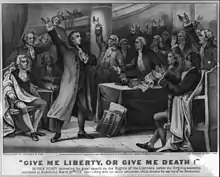Political linguistics
Political linguistics is the study of language as a tool of persuasion in politics, especially speeches and campaigns. It examines the effects of slogans, mass media, debates, and propaganda. [1]

There are strong relationships between political linguistics, social linguistics, and media linguistics.
Use in international negotiations
The study of political linguistics is particularly useful when analyzing international negotiations. International negotiations are complex events with many factors where language and culture barriers often occur.[2] Translators run into difficulties ensuring that nuances and details are not lost in the translation process.
Question Framing
Question framing is the forming of questions to elicit certain responses.[2] This is particularly useful in negotiation as it can lead opponents to answer questions in specific ways. As an example, the Institute for Social Research at the University of Michigan investigated question framing in racial attitudes.[3] The various scientists working on the project found that the wording of questions had great bearing on whether respondents attributed characteristics to an individual or to their racial group.[3] Race has always been a factor of politics and the use of political linguistics to downplay racial tensions may be used by political parties. They could use questions framed to emphasize individual achievement rather than the overarching problems.
References
- Chi, Luu (February 2016). "The Linguistics of Mass Persuasion: How Politicians Make "Fetch" Happen (Part I)". JSTOR Daily.
- Bell, David V.J. (July 1988). "Political Linguistics and International Negotiation". Negotiation Journal. 4 (3): 233–246. doi:10.1111/j.1571-9979.1988.tb00468.x. ISSN 0748-4526.
- Singer, Eleanor; Couper, Mick P.; Raghunathan, Trivellore E.; Antonucci, Toni C.; Burmeister, Margit; Van Hoewyk, John (2010). "The Effect of Question Framing and Response Options on the Relationship between Racial Attitudes and Beliefs about Genes as Causes of Behavior". Public Opinion Quarterly. 74 (3): 460–476. doi:10.1093/poq/nfq009. ISSN 0033-362X. PMC 3045778. PMID 22476404.